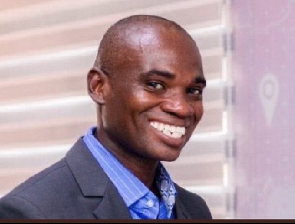As the Election Day (December 7) emerges in Ghana, one cannot help but to watch politicians of all varieties uttering their false promises, commentators of all sort drawing their biased judgments, and supporters at all corners threatening defeat upon their respective opponents. This is Ghana at its best. Some even call it ?democrazy.? But in the midst of all these, I read with great admiration the numerous articles regularly posted on GhanaWeb.com, most of which are written by Ghanaians living abroad. In virtually all the articles I read, I come across two or more ideas that will serve Ghana well, but that is only if those ideas are nurtured and implemented. As a result, I have come to wonder if there is a light at the end of the tunnel for our dear nation.
To give but a few examples, I shall dwell on the articles written by George Abban (posted on GhanaWeb on May 28, 2004), by Kwame Attakorah Abrefah (posted: 07-01-04), by Nii Botchway (posted: 08-04-04), by Juliana Adomako-Gyimah (posted: 09/19/04), and by Adams Ashomole (posted: 11/20/04).
First, in his article entitled ?Alcoa in Alumina ?Politricks? in Ghana,? George Abban presents some important factors regarding the moves by the Ghanaian government to purchase one of the giant companies in the country, VALCO. That is to say the government is in the process of buying the ninety-percent share of Kaiser Aluminum Corporation of the United States. After carefully making his points, Abban comes to the conclusion that everyone involved should be very careful in turning the management of VALCO to Alcoa?the ten-percent shareholder. Perhaps, in Abban?s view, Alcoa is not the right choice. So he writes: ?We should buy time and search for an appropriate partner who would develop the Alumina Refinery in Ghana.? To me, this is no less than a statement by a patriotic son of Ghana concerned about a grand business undertaking in his country.
Secondly, I find a bright mind in Kwame Abrefah, author of ?Evaluating the Zero Tolerance for Corruption.? This article deals with the government?s anti-corruption initiatives. While I do not endorse any administration?s anti-corruption system in Ghana (solely because I find many of the initiatives already taken to be mediocre and ineffective)?I do, however, agree with Abrefah in many respects, especially when he states that ?? to succeed as a nation in the fight against corruption, we need to educate our people, particularly, our children about the new ethical and moral values that govern our conducts.? Of course, since ?ignorance? and ?greed? are two significant factors that keep corruption on the rise in the country, one could hardly challenge Abrefah?s assertion.
Thirdly, in the article entitled ?A Dead Corporation,? Nii Botchway showers blame upon the Ghana Airways Corporation for failing to manage the national Airliner under the umbrella of the NPP administration. Well, this is why the last time I was at the JFK Airport in New York I did not see a long queue at the Ghana Airways check-in space. In short, I understand the feelings of Botchway. But I doubt if the heads of Ghana Airways Corporation will care to read his article, let alone think about speaking with him.
Another article that caught my attention is a short one entitled ?Africa?Our Economic Woes.? In it, Juliana Adomako-Gyimah expresses disappoints over the fact that when African professionals depart from the continent and become successful, they fail to give something back to the continent. In addition, Juliana is worried over the continent?s increasing reliance on the West, especially the IMF. You see, here is another Ghanaian who is very worried about the deprivation of African countries by their former colonial masters. Whether you call it ?neo-imperialism? or ?neo-colonialism??it is time for our leaders to start playing hardball with their Western friends. So Juliana, I beg you to keep on writing.
Finally, in the article entitled ?We Are Sitting On a Time Bomb,? Adam Ashomole criticizes the NPP administration for manipulating the Ghanaian press, especially for its alleged partisan-connection with some Ghanaian journalists. To give you a taste of Ashomole?s discourse, the last four sentences of his article reads:
?What we want to see is a press that will ventilate the sentiments of the ordinary man on the street. What we want to see is a press that is well balanced in its reportage and eschew unnecessary sensationalism. We are sick and tired of half truths and unverified stories. We will soon be tired of the press that has been bought to bed government.?
Perhaps Ashomole is a patriotic son of Ghana calling for positive-change with respect to the media and the government in his country. However, as I see the word ?Landon? written at the bottom of the article, I doubt if he will ever express his views before our Big Men back home.
Like Asholole?s article, all the other articles I mentioned did not emerge from Ghana. As Botchway?s article hailed from Florida, U.S., Abrefah?s article emerged from somewhere in Canada. Both George Abban and Juliana articles are from the United Kingdom. This one you are reading is from New York, where I work and continue my education. You see, we are all in the same boat?that is the brain-drain. Having said that, one is tempted to ask: Why will any smart Ghanaian student or worker depart from his country for another?
While there are different ways to answer this question, one cannot escape the fact that our socio-economic and political conditions make it difficult for our Ghanaian students and professionals to achieve their full potentials. Hence, as a nation, we continue to provide basic and advance education for our young men and women, only to later allow our Big Men (Presidents, ministers, chiefs, and so on) to shut their dreams by failing to work hard?even harder?to reverse the brain-drain.
As a Ghanaian, I don?t think I need someone to tell me about the plight of the many bright young men and women on the streets of, say, Accra or Kumasi, selling ice-water or carrying wood on their heads in order to make ends meet. More so, I don?t think I need someone to tell me that regardless of my experience and qualifications, I need a certain tribal or political connection in order to get a decent and well-paying job in Ghana. I must say that all of these are valid reasons as to why our Ghanaian students and professionals departed (and continue to depart) from the country in numbers.
Indeed, for many years our Big Men have failed one important test: they have failed to reverse the brain-drain. But regardless of their excuses, it is important for them to keep in mind that in order to better any of our economic, social and political conditions, they cannot ignore the brain-drain. Of course, I am aware of what many call the ?African brain-drain.? But I am not concerned with that at the moment. Here, I am concerned with Ghanaian leaders? inability to create the necessary programs, institutions and/or organizations that will eventually bring back many of our patriotic professionals outside the country. After all, without a certain Ghanaian brain-gain, how can we talk about the African brain-drain? Think about it.
So, what our current leaders need to do is to mobilize patriotic and well-experienced Ghanaians?especially the ones abroad?to network and share ideas on how best to develop the country. This is not to say that all senior leaders should pass their posts to young ones. No. Not at all. With the support and help of the government, what is desperately needed, in my view, is a certain idea-network and team-building organizations by Ghanaian students, intellectuals and businessmen of all walks of life as we struggle to save the country from the shackles of poverty, ignorance, illiteracy and corruption.
All in all, let there be no doubt that our current leaders owe of to themselves, and to all Ghanaians, to try as much as possible to start setting the initiatives that will eventually reverse the brain-drain. I believe they can do it by recruiting and retaining Ghanaian professionals outside the country. To do that, they would have to start with two critical reforms in two critical areas of government. The first is to cut down the bureaucratic strings that tend to make things difficult for Ghanaian professionals to show any interest?let alone any effort? of returning back home to work. The second task is to create incentives that will make life a little easier for those who wish to return home and provide their expertise in the development of the country. These may include loan assistance, relocation assurance and competitive salary supplements for professionals based on individual needs. So, Mr. President, honorable ministers and ambassadors, it is time to think more and more about how to reverse the brain-drain. Please don?t ask me why because you and I know that at the writing of this article, the future looks grim for many young Ghanaians. Some bold and long-term solutions are needed to change that. Or what do you think?

Views expressed by the author(s) do not necessarily reflect those of GhanaHomePage.




![Fatawu Issahaku [L] and Jordan Ayew Fatawu Issahaku [L] and Jordan Ayew](https://cdn.ghanaweb.com/imagelib/pics/718/71828066.295.jpg)









